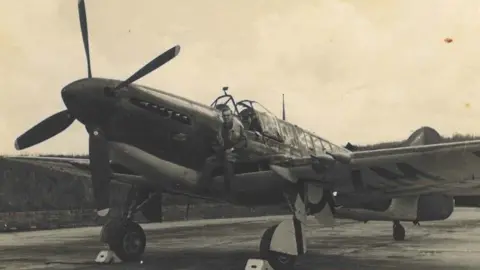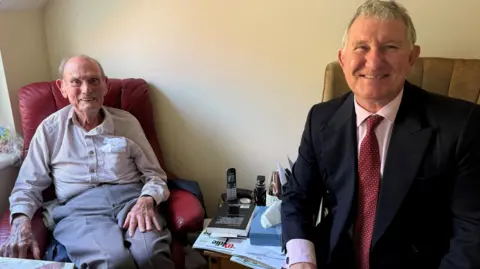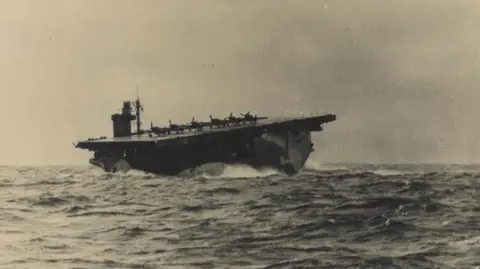WW2 pilot, 103, recalls sinking of German U-boat
 JOHN BARNES
JOHN BARNESA 103-year-old Royal Navy lieutenant commander has been sharing stories with Guernsey's Lieutenant Governor of his service during the World War Two.
Lt Gen Richard Cripwell recorded the interview with John Barnes as part of the Island Memories Project.
It is an oral archive of islanders' memories, initially of World War Two, which is a joint project between BBC Radio Guernsey and Guernsey Museums.
Joining up at the start of the war, London-born Mr Barnes went on to serve for 23 years and said sinking a German U-boat was his biggest contribution to the war effort.
'Attacked by torpedoes'
Having joined up as a naval airman second class, basic training was followed by several months flying training in Canada.
From there, Mr Barnes said he was assigned to flying Fairey Swordfish biplane torpedo bombers, protecting convoys in the Mediterranean and later the Atlantic.
He remembered his first aircraft carrier well - HMS Argus was "the original carrier, built in 1918".
He said: "She was an amazing ship because she was badly placed with lack of watertight doors but she survived the war."
He laughed as he recalled being attacked by torpedoes "once or twice" but "they missed, so that was it".

Mr Barnes described the Swordfish as a "lovely plane to fly, especially if you liked fresh air, because it was an open cockpit".
By February 1943, he joined escort carrier HMS Biter.
He described the work as "interesting" although added it could be boring when the weather was too rough to fly for several days.
He said: "I can remember sitting on the stern, waiting to fly and watching my altimeter go up and down by 50 feet [as a result of waves hitting the ship]."
He added: "I didn't like flying at night because there was so little light. You were terrified you'd lose the convoy."
 JOHN BARNES
JOHN BARNESMr Barnes got lost in the Denmark Strait once in what he described as "appalling weather".
He said a fortnight of cloudy weather after leaving the Clyde in Scotland had meant the ship ended up 12 miles (19km) out of position.
When he and his crew attempted to return after three hours, and with visibility of less than half-a-mile (800m), they were lost.
With radio silence in force, they searched until almost out of fuel and then flew to the nearest land.
It turned out to be the Snæfellsnes Peninsula in Iceland.
Mr Barnes later found out they had landed near Malariff lighthouse.
While one crew member waited with the plane, he described how he and one other trekked in gale-force winds across the volcanic landscape to the nearest town to call for help.
A search party was already on its way to find the trio and Mr Barnes said they rejoined HMS Biter the following day.
'My best effort'
Mr Barnes said they did not often see enemy submarines but he was involved in sinking one on 12 May 1943.
He recalled: "I'd just taken off from the convoy and went straight ahead and there was a U-boat on the surface trying to cross from right to left to get in front of the main convoy.
"I went straight in and dropped my depth charges."
That disabled the submarine and HMS Broadway "finished him off".
Later he was told it was U-89.
"That was my best effort in the war," he said.
Almost 80 years since the end of WW2, Mr Barnes, who moved to Guernsey in the 1960s, reflected on his role.
He said: "It was just something I was part of. I don't think back to it much."
"Just some of the good friends I lost, I remember so well. That was war."
Follow BBC Guernsey on X and Facebook. Send your story ideas to [email protected].
